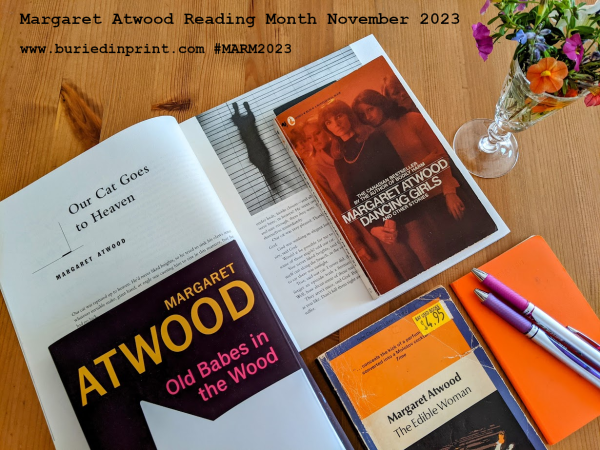Happy Birthday Beryl Bainbridge, who would have been 91 today! I thought I wouldn’t manage a post for Reading Beryl Week hosted by Annabookbel as I had a couple of false starts. I love Beryl but the two I had in the TBR didn’t work for me – probably the wrong time (I seem to be catching #AllTheWinterViruses).
Then I thought I’d let fate decide (admittedly I knew the odds were stacked in my favour, but I just like to pretend to myself that I’m not always going to buy a book 😀 ) and I went to the consistently wonderful charity bookshop across the road from me… of course they had plenty on their shelves, including one I keep meaning to read, An Awfully Big Adventure (1989).
I could just squeeze it in because Beryl generally wrote very short novels; this one comes in at 197 pages. So I’m counting it towards Novellas in November too, hosted by Cathy at 746 Books and BookishBeck.


Set just after the war, young Stella is encouraged to pursue dramatic interests by her Uncle Vernon, who feels she needs an outlet for all her feelings:
“Emotions weren’t like washing. There was no call to peg them out for all the world to see.”
But despite Stella’s emotional reactivity, she is also strangely detached. Uncle Vernon and Aunt Lily raised her, but she is not intimate with them. She never talks to them about what is happening for her or how she feels.
This theme of the distances between people continues when Stella joins an acting troupe at the local theatre, helping backstage and playing small parts. There are complex histories, resentments and intrigues between the players, which Stella only partly grasps.
“Bunny agreed with Meredith that there was nothing wrong with Dawn Allenby apart from her love of beauty, an affliction she was ill-equipped to fight. He put it in a nutshell when he said she was the sort of girl who, if there had been a meadow handy, would have been out there in a flash picking cowslips.”
Stella is naïve and self-focussed, which means the reader sees much more than she does. She can make sharp observations but lacks the sophistication to fully comprehend their meaning. She falls for Meredith, the nicotine-stained, spiky director:
“She suspected it was education and breeding that enabled him to keep his face and his feelings separate.”
But she is so wrapped up in her own feelings she barely registers how little she knows of him, or his lack of any interest in her:
“Endeavouring to be what she imagined was his ideal, she altered her demeanour several times a day.”
The reader knows Stella will never, ever be Meredith’s ideal. But Stella remains wilfully ignorant and intent on very shaky self-reinvention. I would say this seems to be a recurrent theme in Bainbridge – the psychological warfare people can wage on one another, though self-involved disregard of others, rather than outright mendacity.
Also typical of Bainbridge is the witty, pithy turn of phrase and humour threaded throughout the darkness.
“She plumped out my vowels. I tend to have flat ones. It’s to do with catarrh as much as region.”
Apparently An Awfully Big Adventure was partly biographical with Bainbridge drawing on her time working at the Liverpool Playhouse. It certainly felt very authentic, with lots of detail about the daily drudge of postwar life, such as when Stella wants a bath:
“It meant paraffin had to be fetched from Cairo Joe’s chandlers shop next door to the Greek Orthodox Church, and then the stove lugged two flights of up the stairs and the blanket nailed to the window with tacks. In the alleyway beyond the back wall stood a row of disused stables and a bombed house with the wallpaper hanging in shreds from the chimney breast, and sometimes women, no better than they ought to be, lured men into the ruined shadows.”
An Awfully Big Adventure is ultimately very dark. Stella’s seduction by seasoned actor PL O’Hara is treated by Stella with the same detachment with which she views nearly all her relationships. But the consequences will be tragic, and again, the reader is left to realise far more than Stella.
For newcomers to Bainbridge, this would be a good place to start. It covers many of the themes she returns to and is so tonally distinctive, in the way her novels are. For those who are already fans, she is at the height of her powers here. An Awfully Big Adventure was one of the five books that gained her a Booker nomination, which she never won.
“In the end everyone expected a return on love, demanded a rebate of gratitude or respect. It was no different from collecting the deposit on lemonade bottles.”
To end, An Awfully Big Adventure was adapted to film in 1995. I have a vague memory of seeing it in the cinema at the time. This trailer has reminded me how perfectly cast it was, and how much I miss Alan Rickman’s performances:


